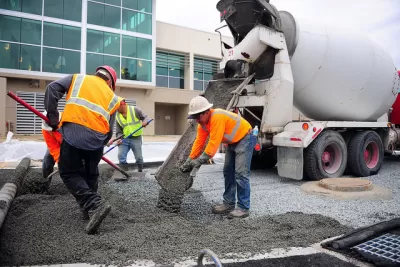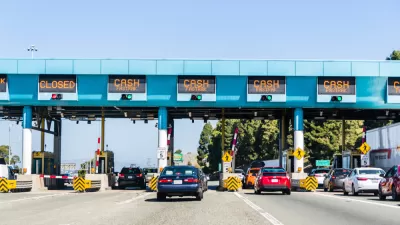Voters looking for a reason to vote against Prop 72, which provides a tax break for homeowners who install rainwater capture systems, won't find one. None were submitted. Proponents of measures for parks, climate, and transportation are not so lucky.

KQED science editor Danielle Venton interviews a Petaluma homeowner who installed a $300 rainwater capture system three years ago "that has already paid for itself" in savings on his water bill. "From the perspective of water managers, [he] is doing something great, but the cost of that rainwater system adds to the value of the house an that could mean higher property taxes, especially for some big systems that can cost thousands of dollars," she states on the audio version of the article.
"That's why lawmakers put Proposition 72 on the ballot," based on Senate Constitutional Amendment (SCA) 9 sponsored by Sen. Steve Glazer, D-Concord, which passed both chambers unanimously, adds Venton.
Rainwater systems catch rain from the roof of a home and siphon it to a large barrel, or even larger cistern, for outdoor use. Prop 72 aims to encourage rainwater catchment by ensuring that homeowners who install a system won't have to pay property tax on the increased value of the home, similar to the way the tax code treats rooftop solar, until the house is sold.
"Proposition 72 is one of the easier questions on the June 5 ballot," opines the Los Angeles Times editorial board on April 24. "Homeowners should be rewarded, not penalized, for collecting the rainwater that falls on their roofs and for using it on their landscaping to save precious tap water."
==========================================================================================
Three more propositions facing voters on June 5
- Proposition 68: $4 billion in general obligation bonds for state and local parks, environmental protection projects, water infrastructure projects, and flood protection projects.
- Proposition 69: Transportation Taxes and Fees Lockbox.
Remember last year's 12-cents per gallon gas tax increase, aka Senate Bill 1? Revenues from the additional gas tax and 20-cents per gallon diesel tax increase are constitutionally required to be spent on transportation, mostly roads, per Article 19,
While the legislature promised all of the SB 1 revenues, projected to be $5 billion annually, would be spent on transportation, two of the new revenue measures, an annual transportation improvement fee [ppt] between $25 and $175 based on vehicle value, and a four percent increase in the diesel sales tax do not fit into the Article 19 'transportation lockbox.'
Prop. 69 fixes that problem, or makes it worse, depending on one's perspective. In addition, it would apply to the entire 13 percent diesel sales tax (scroll down to 'diesel'), not just the additional increment.
Regardless of how one feels about transportation lockboxes, with a repeal of all of the SB 1 taxes and fees all but certain to be on the ballot in November, it can't hurt.
- Proposition 70: Cap-And-Trade Revenues
2017 was a remarkably successful legislative year for transportation and the environment in California. Another landmark bill that passed was AB 398, allowing for the continuation of the nation's only state-run carbon trading program. Similar to SB 1, a super-majority vote was needed, which meant getting a few Republican votes. From Planetizen:
A companion constitutional amendment pushed by Republicans, ACA 1, that will require a two-thirds vote in 2024 by the legislature to pass an expenditure plan for cap-and-trade revenues, known as the Greenhouse Gas Reduction Fund, in 2024. First it must pass a vote by the general electorate in June 2018.
So Californians will essentially be voting on a measure that affects a budgetary item in 2024. For all other years, a simple majority vote will determine the expenditure plan for cap-and-trade revenues.
Environmentalists are lined-up against Prop. 70, unlike AB 398 where they were divided because of concessions made to ensure its passage.
What's very strange is seeing Gov. Brown signing the "pro" argument because if it passes, it endangers one of the governor's "legacy" projects: "Gov. Jerry Brown's High-Speed Gamble." Presumably, it was a promise he made to secure Republican votes to pass AB 398.
FULL STORY: Proposition 72: Capture Rainwater, Get a Tax Break

Alabama: Trump Terminates Settlements for Black Communities Harmed By Raw Sewage
Trump deemed the landmark civil rights agreement “illegal DEI and environmental justice policy.”

Planetizen Federal Action Tracker
A weekly monitor of how Trump’s orders and actions are impacting planners and planning in America.

How Atlanta Built 7,000 Housing Units in 3 Years
The city’s comprehensive, neighborhood-focused housing strategy focuses on identifying properties and land that can be repurposed for housing and encouraging development in underserved neighborhoods.

In Both Crashes and Crime, Public Transportation is Far Safer than Driving
Contrary to popular assumptions, public transportation has far lower crash and crime rates than automobile travel. For safer communities, improve and encourage transit travel.

Report: Zoning Reforms Should Complement Nashville’s Ambitious Transit Plan
Without reform, restrictive zoning codes will limit the impact of the city’s planned transit expansion and could exclude some of the residents who depend on transit the most.

Judge Orders Release of Frozen IRA, IIJA Funding
The decision is a victory for environmental groups who charged that freezing funds for critical infrastructure and disaster response programs caused “real and irreparable harm” to communities.
Urban Design for Planners 1: Software Tools
This six-course series explores essential urban design concepts using open source software and equips planners with the tools they need to participate fully in the urban design process.
Planning for Universal Design
Learn the tools for implementing Universal Design in planning regulations.
Caltrans
Smith Gee Studio
Institute for Housing and Urban Development Studies (IHS)
City of Grandview
Harvard GSD Executive Education
Toledo-Lucas County Plan Commissions
Salt Lake City
NYU Wagner Graduate School of Public Service





























